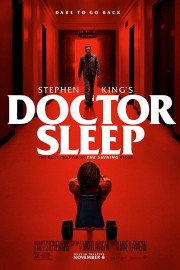Doctor Sleep
I never read Stephen King’s sequel to his classic, The Shining, when it came out earlier this decade, but I’ve always been curious about how the author continued the story of Danny Torrence as an adult, after the events at the Overlook Hotel. Of course, what happens in King’s book (or the 1997 miniseries he supervised from it) is not what happens in Stanley Kubrick’s 1980 adaptation, which is my favorite horror movie of all-time. For writer-director Mike Flanagan, having to figure out a way to reconcile that disparity as he adapts Doctor Sleep I’ll leave for people more familiar with all the different versions of the Torrence’s story; I’m just kind of impressed how well any of this works at all.
Flanagan is a genre filmmaker I first remember seeing his name on with the sequel, “Ouija: Origin of Evil,” which is an interesting film in its own right (and one I still have not seen the original movie for), but whose star has continued to rise through his Netflix series, “The Haunting of Hill House,” as well as another King adaptation, “Gerald’s Game.” That latter film, which managed to adapt a tricky King story into a very good movie, is what put him on the trajectory for “Doctor Sleep,” and it’s interesting to see how he approaches the film in adapting the book, while also making a true sequel to the Kubrick film, which is one King has always had decidedly mixed feelings on. It’s a delicate balancing act that Flanagan succeeds at.
The film begins in 1980, when the events at the Overlook Hotel take place in this film’s world. Danny and his mother, Wendy, are trying to put their lives back together, and we see young Danny talking to Dick Hallorann on a park bench. Danny is trying to move past the traumatic events at the Overlook, and Dick gives him a suggestion on how to do it. Of course, these are not the same actors from Kubrick’s film, but credit to Flanagan for finding actors whom not only look somewhat like Danny Lloyd, Shelley Duvall and Scatman Crothers, but can sound like them, as well; it’s a weird effect, but it honestly works pretty well in this story. We also meet a young girl and her mother camping in 1980, and the girl, Violet, goes into the woods to pick flowers, and comes across a strange young woman by the lakeside, Rose (played by Rebecca Ferguson) whom lures her over; she can sense something about Violet, and her and her “friends”- who begin to appear out in the woods- attack Violet, who goes missing. Cut to 30 years later, and Danny (played now by Ewan McGregor) is an alcoholic mess, whom has taken to locking his traumas away like Hallorann told him all those years ago, but has also turned his life into a series of benders, with no focus. One day, he boards a bus for New Hampshire, and tries to make a new life for himself. He finds himself connected with a young girl around town, however, in Abra (Kyliegh Curran), whom has his particular gift, as well, which puts her on the radar of Rose and her followers, still going after all these decades.
I’m fascinated by how King felt to continue the story of Danny Torrence, and decided to expand the ideas of what Danny’s “Shining” is, in a way that makes it bigger than just a personal story, as well as a personal story, as well. The biggest narrative thread in this film is about how Danny has not let himself process the trauma of his childhood, and it’s made him turn to alcohol like his father did, and how people seeing the good in him- like Billy (someone he meets in his own town, played by Cliff Curtis) and the doctor (Bruce Greenwood) who leads the AA meetings he starts to attend- give him opportunities to trust his instincts, and ability to shine, in a way that can help people. That the film is also this story about a cult trying to get high, and live long, on other people’s essence, is bonkers, but that also plays on the idea of addiction, as well. This is an ambitious idea, made all the crazier by how it works as a straight sequel to Kubrick’s film, which Flanagan gives a big, sloppy tongue bath to whenever he can, whether it’s a visual quotation or a musical one (the score by The Newton Brothers has a lot of them to the Wendy Carlos music and classical works Kubrick used). While I loved seeing how Flanagan paid tribute to a film I adore (and clearly, he does, as well), it does kind of unbalance the movie’s personal narrative when it relies so much on nostalgia for Kubrick’s movie. Thankfully, the performances by McGregor, Curran and Ferguson (playing a fantastically-engaging villain) keep us grounded, and “Doctor Sleep” shines on as a wild ride, and insane horror epic, fans of King and Kubrick will appreciate in equal measure.










